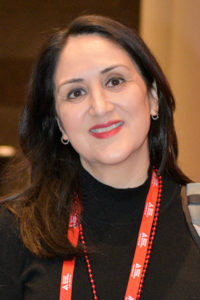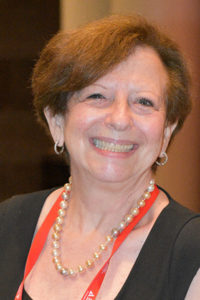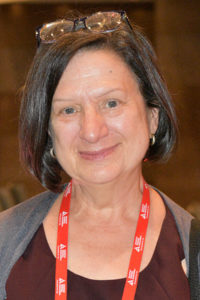
Cynthia E. Muñoz, PhD, MPH, Assistant Professor of Clinical Pediatrics at the University of Southern California Keck School of Medicine, was shy as a young girl, but found her voice by the time she hit her 30s. It has served her well, but raised some eyebrows.
“I have found that speaking up and speaking out is not always welcome,” she said. “On several occasions, this has meant speaking up in a room full of powerful people and being met with silence. Sometimes this has meant speaking up for myself and being told no, or being told that I push too hard.”
Dr. Muñoz opened the mini-symposium Beyond Mentorship: Sponsoring the Next Generation of Leaders on Saturday, June 4, at the Scientific Sessions. The session, which was sponsored by the Women’s Interprofessional Network of the American Diabetes Association (WIN ADA), was livestreamed and can be viewed on-demand by registered meeting attendees at ADA2022.org. If you haven’t registered for the 82nd Scientific Sessions, register today to access the valuable meeting content.
Through her many career experiences, Dr. Muñoz said she has learned not only about the value of a good work ethic and self-determination, but that rewarding outcomes can stem from unexpected plot twists and by looking for outside-the-box opportunities. Most importantly, she said, she learned about the importance of having mentors and sponsors like the members of WIN ADA.

Davida F. Kruger, MSN, APN-BC, BC-ADM, a certified nurse practitioner in diabetes at Henry Ford Health System, highlighted the difference between the 1980s, when she began her career, and today. She showed two photos from her work as a trial coordinator for the Diabetes Complications and Control Trial. One photo showed two dozen or so investigators, all of whom were all men. The other photo showed an equal number of trial coordinators—all women. She was hired as chair of the coordinators by her mentor, Fred W. Whitehouse, MD, MACP, who passed away in 2019.
“He was smart. He was open. He had a brain. He also had three daughters and a wife who said, ‘You know this is the way of the future,” Kruger said.
Among the many pieces of advice that Dr. Whitehouse gave her was to volunteer for the ADA. Since then, Kruger has served as ADA President, Health Care & Education, chair of the ADA Research Foundation, and she has served on the ADA Research Policy Committee. She is currently editor-in-chief of Diabetes Spectrum and Clinical Diabetes.
Kruger told the women at the symposium that if they’re not invited to the table, show up anyway—with a chair. And keep moving that chair closer and closer to the table. Then she recounted how she did just that, by standing her ground with Dr. Whitehouse.
It was in the early days of her career and she had completed about 40 physicals. That became an issue during a meeting because only physicians were supposed to conduct physicals and she was a nurse practitioner. The investigators were questioning whether her physicals would have to be repeated by a physician. She was upset, so Dr. Whitehouse walked her out of the room and said, “Let’s talk about this when we get back to Detroit.”
“And I said, ‘If we don’t talk about it in front of this room at this moment, when you get back to Detroit you won’t have a trial coordinator,’” she recalled. “That was kind of ballsy. But he went back in the room and said, ‘You made me the PI, I hired her, she’s capable and licensed to do the physicals. We’re not going to repeat them. If you want to discuss it further, call me.’ And there was never another conversation about that.”

Judith G. Regensteiner, PhD, from the University of Colorado School of Medicine, started her presentation by explaining how she was rebellious as a teenager and still is today. It’s a quality that served her well when she sat in a room full of men who were asking about her research.
“I would answer, even though it was hard, because sometimes I felt like I was being put in my place. But I didn’t know what my place was,” she said. “I will tell you that your place is at the table. Sometimes you’ll feel like you’re being a bad girl, so to speak, or you’re stepping out of line. That’s okay. You have to live with that. Do what you think is right. And if you’re supposed to be answering questions about your research, answer!”
Dr. Regensteiner shared several practical tips for becoming a leader, starting with creating a mission and a vision for your career by stating what you will do, who you will do it for, and how you will do it. She suggested writing it down and telling friends and colleagues, but also remembering that it’s not set in stone. It can be edited over time.
She also encouraged women in attendance to get a mentor and a sponsor. Many can be found within the ADA membership, or in the world of academia. But don’t bother with people who aren’t immediately responsive, she said.
“Most academics will support you, and if they won’t, you don’t want them,” she said. “You don’t want somebody who is not generous that way.”
[sub-post-content]